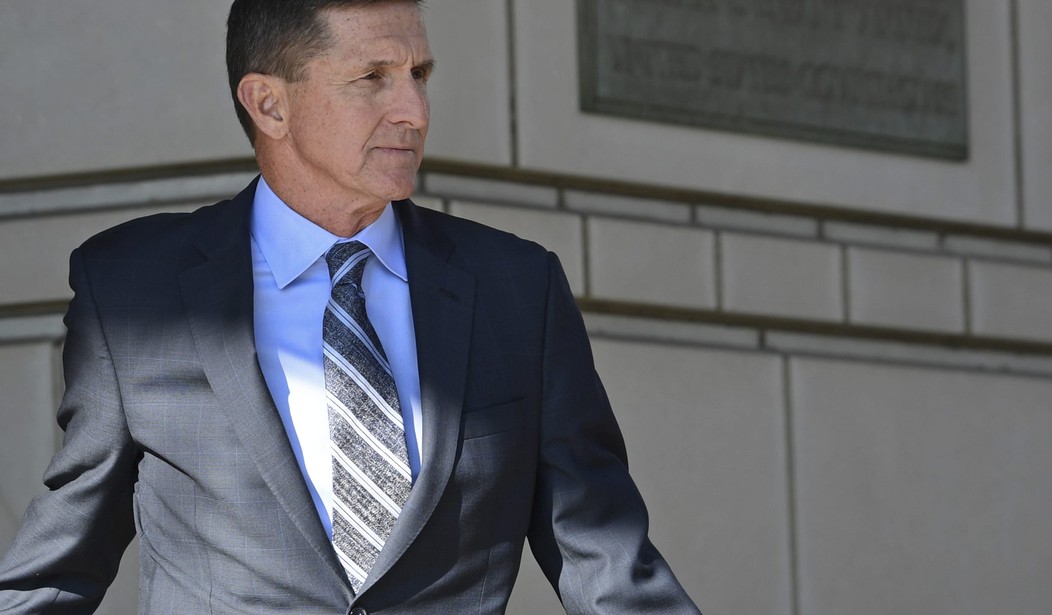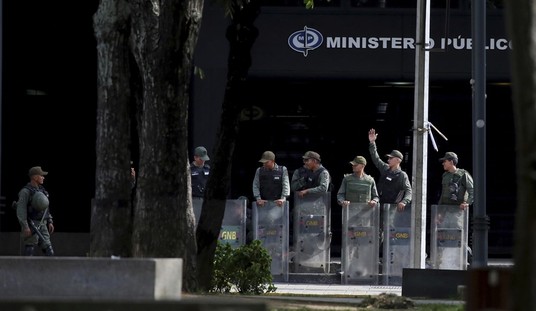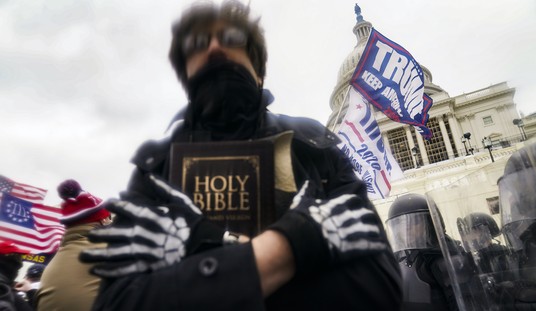The federal judge overseeing former national security advisor Lt. Gen. Michael Flynn’s criminal case is demanding that Special Counsel Robert Mueller turn over all of the government’s documents related to Flynn’s questioning by 3:00 p.m. EST Friday. The documents requested by U.S. District Judge Emmet G. Sullivan include potentially exculpatory “memoranda” pertaining to Flynn’s case.
This comes after a sentencing memo filed by Flynn’s defense team on Tuesday showed that Former FBI deputy director Andrew McCabe suggested that then-national security adviser Flynn not have a lawyer present for his interview with two bureau agents at the White House on Jan. 24, 2017. That interview with FBI agents Peter Strzok and Joe Pientka ultimately led to Flynn’s guilty plea on one count of making false statements regarding wiretapped communications with former Russian ambassador Sergey Kislyak. Flynn “clearly saw the FBI agents as allies” and was “relaxed and jocular,” according to the 302 prepared by the agents. Now, many believe the agents were sent there to catch him in a perjury trap.
The bombshell allegation seems to have piqued the interest of Sullivan, a magistrate known for having a low tolerance level for the shenanigans of federal prosecutors.
Sullivan — who overturned the 2008 conviction of former U.S. Sen. Ted Stevens after government misconduct came to light — is weighing how to sentence Flynn, who pleaded guilty to one count of lying to federal authorities during the 2017 interview in the West Wing. Flynn faced mounting legal bills that forced him to sell his home amid the prosecution, and Mueller has already recommended he receive no prison time.
The judge’s brief order states that Mueller can choose to file the materials under seal if necessary.
Sullivan also ordered the Flynn team to turn over the documents backing up its assertions. The judge could determine why the FBI apparently took a significantly more aggressive tack in handling the Flynn interview than it did during other similar matters, including the agency’s sit-downs with Hillary Clinton and ex-Trump adviser George Papadopoulos.
Flynn is set to be sentenced next Tuesday — but Sullivan’s move might delay that date, or lead to other dramatic and unexpected changes in the case. Sullivan even has the authority to toss Flynn’s guilty plea and the charge against him if he concludes that the FBI interfered with Flynn’s constitutional right to counsel, although he has given no indications that he intends to do so.
Federal authorities undertaking a national security probe are ordinarily under no obligation to inform interviewees of their right to an attorney unless they are in custody, as long as agents do not act coercively. Flynn’s lawyers claimed in Tuesday’s filing that FBI brass had threatened to escalate the matter to involve the Justice Department if Flynn sought the advice of the White House Counsel before talking with agents.
In his order, Sullivan requested Mueller turn over the FBI’s Flynn interview report (known as a 302), a memo written by McCabe, and any similar documents in the FBI’s possession.
The judge is likely interested in finding out why the Flynn 302 is dated August 22, 2017, seven months after the interview took place.
The timeline is important because, as the Federalist’s Sean Davis noted on Twitter, on August 2, 2017, Rosenstein secretly issued specific guidance as to the crimes Mueller is authorized to investigate. On August 16, 2017, ABC News reported that the special counsel’s “top investigator” in the probe, Peter Strzok, had been fired by Mueller in July due to his anti-Trump communications with FBI lawyer Lisa Page, although at the time, no explanation was made public.
And finally, on August 22, the FBI 302 documenting what Flynn told the agents during their conversation at the White House, was written.
In March of 2017, when then FBI director James Comey went to Capitol Hill to brief lawmakers on the Russia investigation, he told them that the agents who questioned Flynn did not believe he had lied. Publicly, in multiple interviews, however, Comey indicated that the FBI believed Flynn had lied.
According to the briefing transcript, released by House Intelligence Committee Republicans in May of 2018, Comey told members that the FBI agents who interviewed Flynn “saw nothing that indicated to them that [Flynn] knew he was lying to them.”
Then-deputy director McCabe also said FBI agents saw no signs of deception in Flynn, but he called the case a “conundrum,” because Flynn’s statements didn’t quite match up with what the FBI knew he said in a wiretapped conversation with Russian ambassador Sergey Kislyak in December 2016.
Inquiring minds want to know why the 302 of Flynn’s interview — in which no one thought he was lying — was written seven months after the interview, and only after Roseinstein’s new investigation guidelines.
Freedom Caucus Chair Rep. Mark Meadows (R-NC) suggested in June that the FBI may have “edited and changed” key witness reports in the Hillary Clinton and Russia investigations.
He also raised the possibility that the FBI misled DOJ Inspector General Michael Horowitz in an attempt to hide the identities of other FBI employees who were caught sending anti-Trump messages along with Strzok.
Meanwhile, in a report released Thursday on “The Recovery of Text Messages on Certain FBI Mobile Devices,” the DOJ’s Office of the Inspector General said the special counsel’s records officer wiped ALL of the data off of Peter Strzok’s iPhone in September of 2017, claiming that “it contained no substantive text messages.” The SCO records officer scrubbed Lisa Page’s phone on July 31, 2017.
“SCO’s Records Officer told the OIG that as part of the office’s records retention procedure, the officer reviewed Strzok’s DOJ issued iPhone after he returned it to the SCO and determined it contained no substantive text messages,” the OIG report said in stating that Strzok’s phone had been “reset to factory settings,” which means it was completely wiped of all of its data.
Additionally, the SCO claimed it “was unable to locate the iPhone previously assigned to Page.” When the phone was finally found, it too had all of its data deleted and was reset to factory settings, according to the report.
After news that Strzok had been fired from the Mueller probe broke in August of 2017, Devin Nunes, the chairman of the House Intelligence Committee, immediately issued a subpoena to the FBI that covered information about Strzok’s FBI demotion. He tried to coax the information out of the FBI and DOJ for three months and was stonewalled. Then, in early December of 2017, someone from the FBI or DOJ leaked the information to the New York Times and Washington Post.
The Post reported that “there is great concern that exposure of the texts they exchanged may be used by the president and his defenders to attack the credibility of the Mueller probe and the FBI more broadly,” and the Times reported that “the existence of the text messages is likely to fuel claims by Mr. Trump that he is the target of a witch hunt.”
Enraged, Nunes drew up contempt citations and demanded that the FBI and Department of Justice explain why they refused to reveal the reason Mueller kicked a key supervising FBI agent off the Trump-Russia investigation, after being subpoenaed and repeatedly asked about it.
“By hiding from Congress, and from the American people, documented political bias by a key FBI head investigator for both the Russia collusion probe and the Clinton email investigation, the FBI and DOJ engaged in a willful attempt to thwart Congress’ constitutional oversight responsibility,” Nunes said in a statement on Dec. 3, 2017. “This is part of a months-long pattern by the DOJ and FBI of stonewalling and obstructing this committee’s oversight work, particularly oversight of their use of the Steele dossier. At this point, these agencies should be investigating themselves.”
The difference between how Trump and his associates have been treated in the Russia probe and how Hillary Clinton and her associates were treated in the Clinton probe is stark and appalling.
As Fox News reported, “Clinton brought a total of nine lawyers to her interview — a number that fired FBI Director James Comey said was ‘unusual … but not unprecedented’ in House testimony in September.” Also, a number of subjects in the probe were granted immunity, without having to provide anything in return.
A scathing report released earlier this year by the Department of Justice’s inspector general (IG) found that the FBI had taken actions “inconsistent with typical investigative strategy” by allowing former Clinton chief of staff Cheryl Mills and ex-campaign staffer Heather Samuelson to sit in on the Clinton interview — even though “they had also both served as lawyers for Clinton after they left the State Department.”
Several Trump associates have been hit with false statements charges as part of the Russia probe, while no one interviewed during the FBI’s Clinton email investigation was ever charged with anything – although some witnesses reportedly made false statements to the FBI and destroyed evidence.
In his closed-door testimony with House Republicans on Friday, Comey acknowledged that the FBI “didn’t know whether we had anything” when it initiated its counterintelligence probe into possible collusion between Trump campaign officials and the Russian government in July 2016. He added that “in fact, when I was fired as director [in May 2017], I still didn’t know whether there was anything to it.”









Join the conversation as a VIP Member